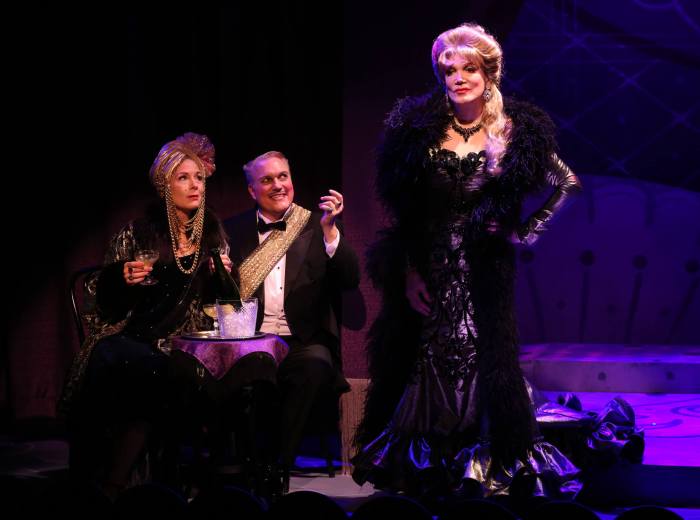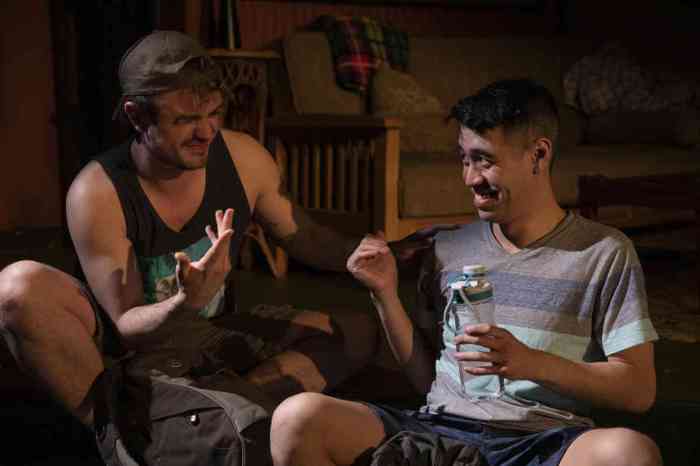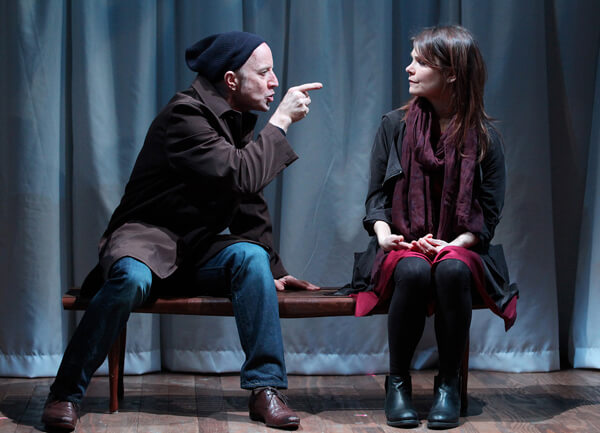Aubrey Dollar and Mia Vallet in Lucy Thurber’s “Ashville,” part of her five-play “Hill Town” cycle at the Theater: Village Festival through September 28. | SANDRA COUDERT
Something rare and exhilarating is happening in the West Village through September 28. The Theater: Village Festival is underway, featuring five plays by Lucy Thurber running in repertory in four venues. Produced by Rattlestick Playwrights Theater in conjunction with Axis Theatre, Cherry Lane Theatre, and the New Ohio Theatre, the mission of the festival is to focus on the work of an individual playwright.
This is the festival’s inaugural year and it features five plays from Thurber — four revivals and a world premiere — under the banner “The Hill Town Plays.” The plays, in chronological order of the storytelling are “Scarcity, “Asheville,” “Where We’re Born,” “Killers and Other Family,” and “Stay.”
“This huge downtown gang is getting to do something that feels so incredible,” Thurber said of the festival, the brainchild of Rattlestick artistic director David Van Asselt. “A lot of us came to New York with the Village of the 70s ringing in our ears. It’s exciting to feel as though we’re all part of that.”
The plays are set in the hill towns of western Massachusetts, where Thurber grew up after moving there with her single mother at age nine. They track the coming of age and young adulthood of a woman who is from the towns but eager to get out. While each of the plays stands alone and the characters’ names and some details vary from one to the next, the unifying themes of poverty, lack of education, striving to move beyond the situation of one’s birth, and the desire for love and, most of all, safety run throughout. Thurber has awe-inspiring versatility and skill as a playwright, and to see the plays together offers full sweep of Thurber’s vision and a profound emotional journey with her characters.
She also emerges as a uniquely American voice, and while a gay theme, heartbreaking and real, runs through the five plays, it is, as well, a metaphor for — as Thurber described it — “that feeling of being an outsider that is identifiable to anything. In this cycle, it’s about a girl, class, and socioeconomics.”
The girl at the center of all five plays (variously named Rachel, Lily, Celia, and Elizabeth) strives for the education she lacks. It’s a lifeline but her seeking it serves to distance her from the people around her — a contradiction that is the constant and compelling tension in the plays and apparent even at her youngest age in “Scarcity,” the first in the cycle chronologically.
Across the five plays, she is often in survival mode, actively reminding herself to be present. The character turns out to be a writer and it is in creating stories that she saves herself.
“Very few of us come from safe backgrounds,” Thurber said. “So the question becomes how do we as individuals create narratives that allow us to continue to exist.”
In the end, survival comes from being brave enough to see the full narrative and make the changes that move us beyond merely existing from moment to moment.
Narrative can be understood on an individual or a cultural level, and what makes this cycle resonant as literature is that the conflicting narratives in the world of the Hill Towns is an incisive metaphor for any place — country, family, or business — where conflicting narratives create conflict. Each play has three distinct types of characters — those who can see another way and work to get out, those who can see that out but are trapped, and those who can see no further than the present.
The play’s central girl characterizes the first type. There is real heartbreak in characters like Drew from “Where We’re Born,” who can see the cosmos but can’t see a way out of the Hill Towns, or Amanda in “Asheville,” who wants to leave her past reputation behind but has no idea how to move on. And then there are the parents, cousins, and other denizens of the Hill Towns who seek nothing more from life.
There are also characters from outside, such as the teacher Ellen in “Scarcity,” who first gives the girl and her brother the idea that they can surmount their circumstances, or Claire in “Killers and Other Family,” who has made a life for herself beyond the bonds imposed by her origin.
Combustion is an inevitability in Thurber’s work, and violence, both physical and emotional, is a constant in the plays.
“Violence comes when you run out of words,” Thurber explained. “If you grow up without a sense of recourse, a sense of immediate justice, the only recourse you have is violence. These are people coming from a world where they lack a sense of control over their lives.”
Added to the violence are a lot of drugs and alcohol, but more than anything, entrenched narratives about what life is all about that present the obstacles the girl at each play’s center must overcome.
As a playwright, Thurber is consistently bold and innovative. She imbues even the minor characters with life and richness and is willing to play with form and convention. While “Scarcity,” for instance, is fairly literal and straightforward, “Stay” explores form, abstraction, and the ways language can be harnessed as a survival tool. For Rachel in “Stay,” her words become a bulwark against her past. Her greatest challenge is in figuring out what might happen if she lays down her arms.
The five plays, each featuring different casts, directors, and technical teams, nonetheless have a sense of artistic unity. Throughout, there is a constant sense of lyricism beneath the brutalities, and the sense of place evoked in each play put Thurber’s Hill Towns on a level with Faulkner’s Yoknapatawpha County or Edgar Lee Masters’ Spoon River — as both a real place and a compelling metaphor. The casts are uniformly excellent as are the directors, making this festival an event not to be missed.
THEATER: VILLAGE FESTIVAL | Through Sep. 28 | $56; $125 for five-play pass | Tickets, schedules at theatervillage.com
SCARCITY | Cherry Lane Studio | 38 Commerce St., btwn. Barrow & Bedford Sts.
ASHEVILLE | Cherry Lane Mainstage, 38 Commerce St., btwn. Barrow & Bedford Sts.
WHERE WE’RE BORN | Rattlestick Playwrights Theater, 224 Waverly St., btwn. Perry & W. 11th Sts.
KILLERS AND OTHER FAMILY | Axis Theatre, One Sheridan Sq. at Seventh Ave. So.
STAY | New Ohio Theatre, 154 Christopher St. at Washington St.


































